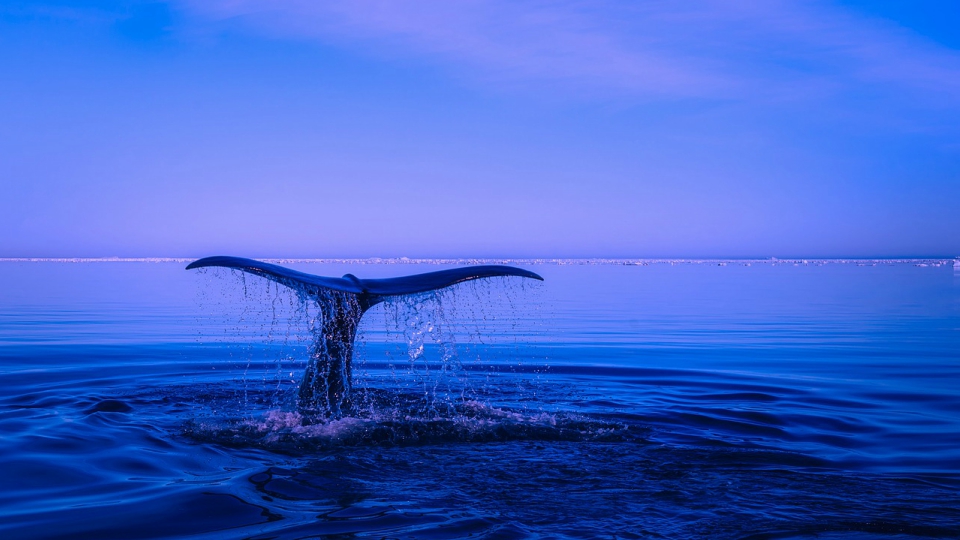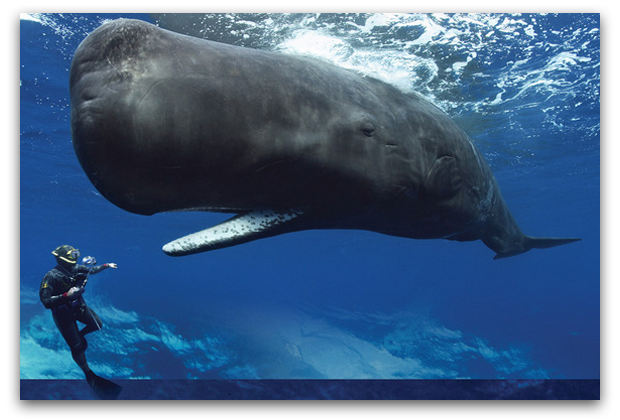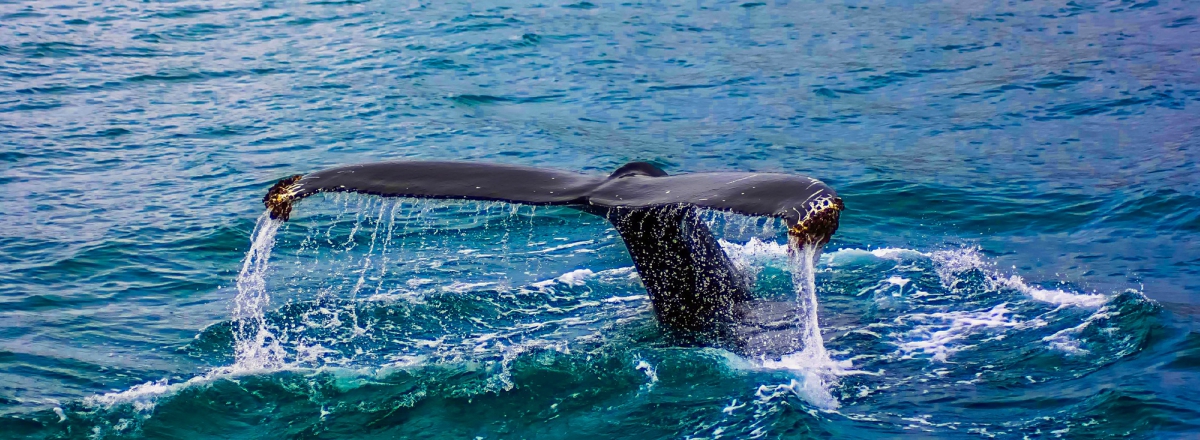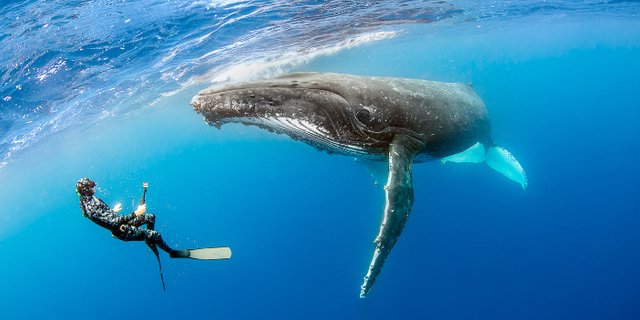The giants of the sea
Are you a lover of records? Well, here we have an animal that has several of them, a champion not only of the sea but we can say that it has the record of being the largest animal on the planet. There is nothing! Despite this curious distinction is not the animals that cause fear, they seem harmless and quiet unless they are disturbed, something that the writer Herman Melville made very clear in his terrifying story about the most famous whale in the universe, Moby Dick, harassed by Captain Ahab, in an obsessive and self-destructive pursuit of that great white sperm whale that defended himself when he intended to hunt him.
Did you know that the whale has the heaviest heart? It can reach 600 kg. How much love this animal keeps! And the weight of his tongue? 2.7 tons, to move that tongue to talk and, do not be scared, but you can get to have a penis of 2.4 meters in length, no comparisons can fit. The biggest whales that exist are these.
BLUE WHALE
The largest specimens can reach 190 tons, is the largest of the largest but not the thickest. It is a rather elongated animal that makes you can move fast and likes to be alone, sometimes you can see a couple of copies together or a mother with her baby but they are not usually in a group. Do you know that a whale calf can consume between 100 and 150 liters of breast milk per day?
Recently two specimens of blue whale, balaenoptera musculus, have been seen in the estuary of Muros and Noia in Galicia, "We can imagine that the whales left our shores, driven away by the whaling industry and that they are now returning," says Bruno Díaz, director of the Bottlenose Dolphin Research Institute (BDRI), an organization based in O Grove, which was the one that found the second cetacean. This data is very encouraging as it is estimated that of the approximately 250,000 blue whales that existed in the nineteenth century were reduced to 400 in the year 1966, the year in which the decision was taken to protect them and it was recovered to 20,000 current specimens.

The Natural History Museum of London has its particular blue whale as the main character at the entrance, Michael Dixon its director explained, "put our blue whale, 'Hope' (hope, in English), in the center of the museum, between the living species in the west wing and the extinct ones in the east wing, is a powerful reminder of the fragility of life and the responsibility we have towards our planet. "
BALLENA FINBACK OR FIN
With a weight that can reach 74 tons, the fin whale or fin, humpback or fin whale (Balaenoptera physalus) is the second largest animal in the world, this species is in danger of extinction due to the hunting it has been submitted for commercial purposes, only in 2009 Iceland captured 125 of these whales, if we add those that collide with the boats (it is curious but these whales are the most collide) and pollution, the Finback Whale is considered in danger by the IUCN (International Union for the Conservation of Nature).
In April 2017, two specimens were spotted on the Catalan coast of Sitges, a mother with her offspring, it seems that every year they come in search of krill, a plankton formed by small crustaceans, the main food of the whales. Volunteers of the Association for the study of cetaceans Edmaktub, took advantage of the occasion and filmed spectacular aerial images with a research drone.
FRANK WHALE
These huge animals of more than 100 tons, have a very characteristic bulbous head with some calluses covered by crustaceans that give it that whitish color and a v-shaped orifice that is unique to this species, the body also covered in villi make it the ugliest whale in our collection. However, the Eubalaena australises is a whale with a very high fat content and that is why it is highly valued, as well as sperm whales, at a time when this oil was also used as a fuel for cosmetics and as a lubricant for precision machinery . If you have ever heard about the properties of whale sperm you should know that it is not exactly that but this whitish fat.

POLAR WHALE
Here we have a relative of the right whale, they are a little less heavy since they can reach 'only' the 74 tons, their body is robust and they do not have a dorsal fin. The polar whale is also known as the Green Whale or Arctic Whale because it is the only species of whale that lives permanently in cold subarctic waters. Because they do not swim very fast they were a perfect target for whale hunters and it seems that there are not much more than 20,000 left in the world. Commercial whaling in Greenland has been banned since 1931 but this law is continuously violated.

HUMPBACK WHALE
The humpback whale whose scientific name is Megaptera novaeangliae, is also known as megáptera, jubarta, gabarte or xibarte, is one of the most recognized due to its characteristic physical features as they have tubers in the head, pectoral fins that can reach the 5 meters resembling some wings and its caudal fin has black and white spots with jagged ends as unique as the fingerprints and are the most spectacular whales as their great jumps and swipes with the dorsal fin and pectorals attract the curiosity of observation tourism of marine animals. These animals have a hunting method characteristic of them, they call them "cages or bubble nets", sometimes they gather their prey and exhaling air to create an upward spiral of bubbles that causes the fish to be trapped against the surface of the water. who take the opportunity to catch them with their mouths open. Have you ever heard about the song of whales? Well, these curious humpback whales are the protagonists, the male emits whistles and shrieks that seem to be divided into verses sung with a certain order and that can last up to half an hour, it is very curious the fact that the males of a given territory ' they sing 'the same songs.

The ocean and the species that inhabit it are one of the wonders of planet Earth, man has annihilated thousands of species with their unhealthy lifestyle for the environment and whales despite their pacifism and large size have been decimated since centuries. The whales with their enormous size are not considered dangerous but they are one of the marine animals more intelligent and cordial with the human being. Perhaps the reality would have been another to pay attention to the French Jean-Marc Côté when at the beginning of the 20th century he ventured into a series of postcards presented at the Universal Expo of 1900, an imaginary year 2000 in which the whale would serve as public transport, whale-bus. This dream would have avoided the massive hunts that caused the death of so many whale specimens, turning this animal into another one in danger of extinction.
Así es que se hace un post, te felicito, upvote for you, un abrazo.